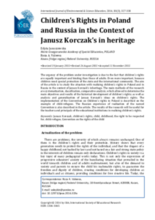The aim of this article is to study the situation on realizing children’s rights in Poland and in Russia in the context of Janusz Korczak’s principles by using the following objectives:
- Analyze the historical and pedagogical literature for the study of "children’s rights” notion;
- Describe Janusz Korczak pedagogical ideas on children’s rights;
- Reveal the realization of Korczak's humanistic ideas on Children’s rights on the example of the of Child refugees in Poland;
- Describe the situation with realizing children’s rights in Russia.
In analyzing the historical and pedagogical literature for the study of “children’s rights,” it is important to consider the Declaration of the Rights of the Child adopted by the UN on the initiative of Poland in 1959, which resembled the Universal Declaration of Human Rights (1948) and the Geneva Declaration of the Rights of the Child (1924). The Declaration contains the primary rules that refer to children's rights. These cited documents form the basis for the rights of every child, and of children in war and child refugees
J. Korczak instiuted and produced the ideas of regard and respect for children's rights. He fought for their equal rights and emancipation. He believed that children should be treated with respect and dignity. Korczak contended that children possess a multitude of rights, which adults must implicitly admit. “The child has the right for respect of his ignorance and his cognitive labor; his failures and tears; mysteries and deviations of the hard labor of growth; the current hour and the present day; the mystery of correction; efforts and credulity.”
Since 1991 children from many foreign states seek shelter in Poland. Children who come to Poland with their parents apply jointly for refugee status. The application for refugee status is therefore granted to children along with their parents. In 2014, 6,621 people applied for a refugee status in Poland.
Under Polish law, unaccompanied minors must be delivered to professional foster parents who serve in family emergencies or an interventional education care facility. The facility must:
- provide immediate care for a child during a crisis;
- provide access to training tailored to age and developmental abilities;
- provide care and nurture until they are restored to their natural family, placed with an adoptive or foster family or placed in a family type social care and educational facility;
- provide access to psychological and educational assistance appropriate to disorders and developmental deviations or specific learning difficulties.
Approximately 88% of children placed in foster care voluntarily leaves within the first six months of arrival. In most cases, where they are and what is happening to them is not known.
Statistics show that the number of orphans in Russia, accounting for every 10,000 children is one of the highest in the world. Every year about 100 thousand children in need of care are revealed in Russia. More than 104 thousand orphans are living in Russian orphanages.

